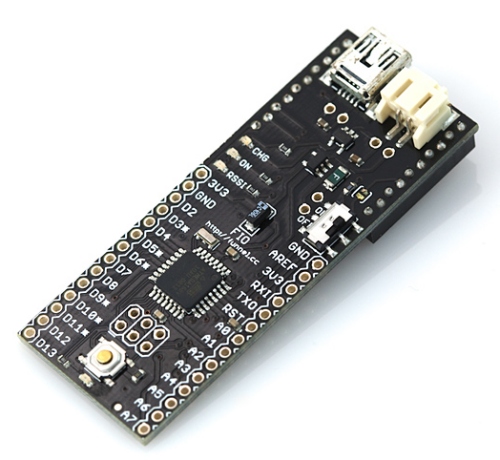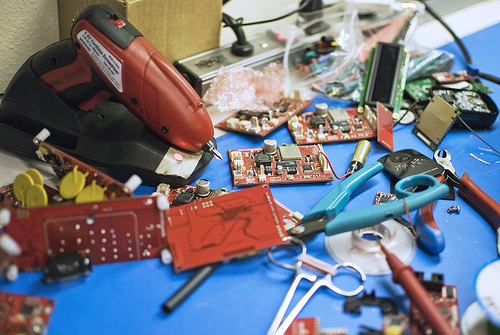SparkFun is not like BMW. We will never be the company to produce the luxury market version of breakout boards and development tools. I believe the only way SparkFun will survive this quickly changing world is to be malleable. We have to be ready to change.
SparkFun's audience is often a first time user and we want them to have the best experience with the documentation and resources like tutorials, pictures, example code and anything else we can provide to make them successful. By constantly revising our products, we often find ways to make it more likely for our users to succeed. The firmware will get better, we will figure out better power protection, and we'll make the end product easier to use. This causes lots of stress on our production line (there's lots of bribes from engineering when we forget to breakout the right test points), but over the past 9 years of building stuff, we've figured out ways to change quickly. Thanks to the huge efforts of a team of people we can change any part of a design (PCB layout, schematic, BOM, firmware, test procedure, test jig, kit instructions, product description, product images, you name it) in days, not months.
Phillip Torrone recently posted a great article on problems and counterfeits in the Open Source Hardware (OSHW) world. All sorts of great discussions ensued! Jan Malasek from Pololu made some great points about the appropriate time and place for OSHW and Paul Stoffregen raised some valid concerns that OSHW may encourage lower quality products. I'm here to state two things about OSHW as it works for SparkFun.
1) OSHW makes us a better company. Releasing the design files for a product means you have enabled all your customers and a few competitors as well.

We sold the original Fio for about 12 weeks before Seeed Studio sold a better version.
Eric Pan runs Seeed Studio and does a fine job of it. They did everything right (kept the license intact, gave attribution where required) and even improved the design a bit (they used easier to find parts).
Now imagine what it was like in the SparkFun offices the first time we saw our product (our baby) built by someone else? It was not easy. But guess what came of it? We now know we need to innovate, and do so constantly. If we can't be the best at something, we'd better get the heck out of the way. Intellectual property allows for some protection, albeit at a legal expense. On top of that, IP holders can be tempted to sit on their laurels and in this day and age, that can be the kiss of death. We use open source hardware as a way to stay sharp.
2) OSHW makes for better products. We believe it is better to iterate on a design and be and transparent and forthcoming as possible. You will find some SparkFun products with silkscreen errors and even green wires. We have even shipped kits without the PCB (!!!). Yep, we screwed that one up badly but we contacted the customers as soon as we found out and sent out the missing PCBs. All lessons cannot be learned in a vacuum. At SparkFun, we find it's better to give our customers the most options possible, listen, then incorporate their feedback into new product revisions, which is very much in line with the sprit of open source.
Some could argue that shipping an unfinished product is not the correct way to do business. I have had to train myself and the people around me that a project is never done, there is always ways to make it better. This is the basis of engineering. We believe we should get the product to do one thing well and then set it free and allow others to hack on it. What we thought was an important feature may turn out to be needless.
It may not appeal to everything, but is this fast release cycle a good thing or bad thing for Open Source Hardware? I believe this is the core of why OSHW is fantastic. We have learned from our problems and we share them so that others do not make our same mistakes. In a very clear way, we educate and enable our customers and our competition equally. Similarly, we will stand on the shoulders of folks who have had great ideas (Leah Buechley, Brian Schmalz, Bill Premerlani, and countless others) and made powerful tools (Arduino, Saleae, mbed, the list goes on). What will separate companies from one another in the future is not their designs, it will be their service, their quality, their price and their ability to produce meaningful products. This is the nature of the game we play and it is my job to make SparkFun the best at responding to incremental change that allows for better end products and happier users.










What Nate states here is the ideology of America's Free Market enterprise. What better way to drive better products and service than to take on all challengers?
Very well done article, Nate. This should prove to everyone that sharing ideas and experience can do nothing but benefit everyone, even the companies involved.
As I like to say to people I help, "Pay it forward." I don't want compensation for sharing my ideas and experience, I want whoever I helped to do the same to the next person. Don't sit on your laurels and be proactive in the OSHW community and help each other out.
It's important to be clear in your own mind about your goals. I was working at Intel during the launch of the original Pentium, and learned an important lesson about influence by observing what some very smart upper managers did.
Intel was frustrated during the early years of the 486, because many motherboard vendors simply slapped a 486 into 386 motherboards, since the parts were compatible. Unfortunately, without a 486 chipset on the Mobo the 486 was hobbled. This frustrated Intel to no end. So.... Intel started motherboard and chipset divisions. Originally they had no intention of making mobo's a huge business unit. They went into the business of producing "rabbits". A rabbit is a design that has the latest features that make people go "ooooh, I need that". The idea was to create demand pull in front of the clone makers (the hounds) so that they would chase the rabbit. Then when all the clone makers are paving the streets with the latest features, simply declare victory, kill your own production, and move onto producing the next rabbit.
Anyway, my point is if you want to be very influential as opposed to owning a particular market, the cloners are wonderful friends. Influence can be monetized in many interesting, indirect ways.
The 486 as introduced could not be used on a 386 motherboard and was not pin compatible.
Later Cyrix introduced some 486 clones with a 386 compatible pinout and I heard some rare vendors introduced socket adapters which allowed the use of a 486 in a 386 motherboard. None of that was available until years after the 486 was on the market.
But definitely influence is often more powerful than control. Look what happened to the IBM PC business when they introduced the PS/2 and tried to control the market instead of influencing it. How often have you used Microchannel lately compared to PCI?
Great comment dbc. this pretty closely follows the macroeconomic principles of commoditization. Stay ahead with innovation by "changing the razor". As long as the incremental change doesn't leave the "old" versions without support - even a 3rd party market - then customers won't sour, they'll stratify across the product offer range.
I think that current standards are established more by the user, as their expectations have such a strong influence on the market.
And this is also SparkFun: not only posting news about products or classes, but also about their philosophy and goals---and then not the cr*p that other businesses have on their websites (vision, mission, etc.) but the real thoughts behind it, and how to accomplish it, and failures, and successes... :)
PS That's a lot of "and" in the 2) OSH makes for [...] paragraph, how about changing one to "as"? ;-)
I, and many others, appreciate the transparency in business philosophy and direction. While many corporations stand behind veils of an image, they hide their true directives and intent. Would you date someone who only told you want you wanted to hear? Of course not, they wouldn�t be trustworthy. As stated, I want to conduct business with companies and people who have my same good willed drive to improve the future. Thank you Sparkfun, thank you.
The more OpenHardware, the more BatchPCB will be busy. Right now I'm integrating an AVR with the SkyTraq Venus GPS module, but some revision later will be all SMT with everything on one board and be available. BatchPCB should have an open hardware section. I plan to publish my designs there and maybe with the corresponding software on github.
It is like (GNU/)Linux. Great artists steal. When I need a hash or sort or something, I can grab and integrate 80% as well as learn. Openhardware I hope will become like the standard libraries programmers use.
Also "can't be the best" depends on what you are aiming for. Some things will be less expensive, some things will have more features, some will have special purposes. You have the arduino, but I like the 3.3v pro and even the lilypad. Which is best? it depends on what you want to do.
And now that you publish the eagle files, I can now create a remix to break out the pins you decided not to - I really need more than one input capture, oh and I need to add that 32k SPI ram to the openlog when I get a chance :).
And your "product" isn't hardware or breakout boards as such, it is innovation itself. The whole point is to add new and updated products all the time, improving them.
Not unlike the F-35. Some argued shipping an unfinished fighter jet was not the correct way to do business, but Lockheed was right.
When I saw the comment about being better to iterate on a design, one thing popped into my mind that has been a big frustration for me (Not so much with SparkFun as other places, but still worth mentioning) and that is that with many projects like Arduino and compatible devices (or shields for it), the fact that there are many versions can make it VERY confusing, especially for a first-timer, or someone who's trying NOT to buy the wrong thing, if there is conflicting documentation, or NO documentation. For example, I've seen shields that for one reason or another aren't compatible with either a 3.3v arduino, or maybe the mega, and then there are comments from users about "Yes it is compatible, if you cut this trace, or change this code", etc.
Perhaps even more a comment to the USER community, but also to a company like sparkfun, is that it's important where there's more than one version or application of a device, to distinguish as much as possible, what versions your comments or documentation is about.
I think Sparkfun gets it about as "right" as possible, in that even for parts that aren't made anymore, or for those which have been upgraded into new parts or versions, the blogs and documentation for those old parts remains on the website, intact, where it always was.
Another example of where the unlimited open-ness and ever-changing world of OSHW is potentially blocking me from just jumping into something new is in the world of 3d printers... There's just SO MUCH outdated information on the web that it is REALLY HARD to know what to buy to make a copy of any one specific device, and while I appreciate the choices, I dont want my first buy to be wasting hundreds of dollars on the "old version" of something because that's what I read in a blog. Focus on documentation is boring for the engineer, but it's important!
Awsome.. And just the fact that Sparkfun employees actually respond to posts like this is more evidence of the whole environment that you're creating to facilitate all kinds of hobbyists, and it why I ALWAYS go to sparkfun first for anything I'm looking to buy. Keep it up, and thanks for all of you to care enough to read and respond to posts!
This is exactly why I have you guys bookmarked right in the middle of my browser
Odd how the "green wire" 9DOF board is labeled as a "ding and dent", but doesn't show up in the "ding and dent" category.
You will never make the luxury hobbiest boards? Seeed Studios looked at your open source design and improved it? You spend a third of the text above complaining about your own lackings such as green wires, missing PCB's. What I'm reading here sounds more like a cop-out and making excuses than an actual look at the reality that you did successfully identify lackings... lackings you need to move on. And what is this about listening to customers? A flaw was pointed out in the BMP085 breakout board in the public comments right below the product page and for two years it remained neglected and when I re-reported it I was poorly treated, till later, when it turned out the reports of mine and two years prior were correct. Is a marketing guy writing up this text to distract us, or is a real businessperson bent on improving? I object to the notion that A. It is hard. B. We are doing all we need to continue making profit. and C. It's good enough. I see Sparkfun's potential. Sounds to me something like you're going to let it "burn out". You're saying Seed Studios can beat you. Betcha Lady Ada can too. JeeLabs has got you too with products more advanced than your own. What I'm hearing sounds like "we're tired." But I see such a huge potential with an already serious base to work from.
Hi Member - I'll try to answer your questions but may miss one. Let me know:
I'm sorry it what I wrote sounded like a cop-out. I tend to err on the side of admitting when we mess up, try not to beat ourselves up too badly, fix it and move on.
I don't see a comment with your name on it on the BMP085 product. There's a lot there. Let me know what issues you're talking about. We test each board and verify functionality. We've had thousands of units deployed in the field with very few failed units of which we've tried to verify with the customer how the unit failed.
I would like to believe I am a real businessperson (though I regularly admit I never took this class in college) and I am bent on both business and personal improvement.
I don't doubt other companies will come out with better designs - that's actually what I was trying to say in the post: it's what drives us to make better products. The speed at which things are changing makes designing always something new an uphill battle. But I don't think anyone here would say we're tired, rather, we're ready for it.
BMP085 breakout board product page... in the comments below.... read.... a user 2 yrs ago complained that he removed the chip from the breakout board and found power to both the analog and digital VCC pins, it was connected to only one. It was further pointed out a bit further down that the VCC pin NOT connected showed VCC leaking to it from the other pin, but that it fluctuated and went below spec minimums. VCC in this case is required for VCCA analog supply and VCCD digital supply. Having them tied together induces noise into the analog portions and degrades performance and this is why there are two separate pins. Then just a few months ago I purchased same item and found same thing while trying to isolate and supply each separately for higher performance. Contacted tech support about this error in your design and was told I was wrong. I insisted, I pushed, finally tech support took a real look at the breakout board (apparently for the first time) and found what I and the other poster 2 yrs earlier said about VCC being incompletely connected were true. I've retained all the emails I was involved with, and you already can look back right now and see the two year old comment by another user trying to point it out to you. Listening? Listening? Go look! Half the evidence is on YOUR website, half the evidence is ON THE BOARD, and I've got the emails I was involved in. Listening?
It turns out that there was an extremely subtle error in the Eagle files for that product (two lines looked connected but were actually not), which we admittedly missed when trying to verify our customer's concerns. The fact that the board worked and passed all of our manufacturing tests (these tests are for overall functionality; we have no way of verifying the board is performing at it's maximum sensitivity), further masked our error. Once the error was discovered, we immediately fixed it and are working to put the improved product on the storefront as quickly as we can.
We get a LOT of feedback from our customers, some of which is correct, and some of which isn't. We do our best to investigate all claims that we're not doing things right, and fix things if they're not. This is one time where an error fell through the cracks - our team did its best to verify the error when it was presented to us, and due to the subtlety missed it. As Nate says, all we can say is that we're sorry, learn the lesson about that particular mistake, and do better next time.
old word = steal new word = leverage
Sharing, especially sharing ideas and knowledge, is a concept as old as communities themselves. So it's not stealling if you let someone else take the thing in question. To paraphrase Thomas Jefferson in regards to sharing ideas; If someone lights their candle from mine, I'm not diminished.
OSHW, this is your development team: http://monotonousflute.files.wordpress.com/2011/02/environmentpainting-the-world-green.jpg
Amen. Truly this is what Sparkfun and OSHW is all about. Nice job guys and keep up the good work. I know I wouldn't know remotely as much if you guys were not here.
With all due respect, like Linux and OSS, OSHW will define some gains, but the truly giant leaps will still come from a single individual genius. Open Source is the BORG equivalent of genius. Flame away!
There does not need to be opposition between those two things - in the hardware or software world. At its simplest, OS* enables a greater number of potential geniuses with access to the technology they need to activate their potential.
OSHW so far has done a great job of illustrating a symbiosis between closed systems, component manufacturers, suppliers, hackers, and end users. Rather than pit technologies against each other, companies like SparkFun give us means to fill gaps, by building "short-cuts"
I believe individual geniuses would find their way anyway, but if OSHW gives them a little boost, so much the better.
hear, hear!
OSHW seems to come from a very different direction culturally than OSS, at least when looking at the whole history of OSS.
OSS sought to make more software available to more people, and prevent any one party from deciding the destiny of a product - this was a reactive approach that usually meant private companies would establish what it was the people would get and OSS would do its best to keep up. This is a pretty broad brush to paint with, but as far as end users are concerned it has been pretty reliable.
OSHW on the other hand seems to be about enabling more individual, unique endeavors, by inviting people into the process in a way that optimizes reconfiguration, evolution, and education in the design process. The result is not often cheaper hardware (unless the alternatives were padded by thick margins) but products that could enable new and interesting uses of technology previously unavailable to hobbyists and even end users.
Put more concisely OSS has (historically) allowed people to catch up to closed source, but OSHW has allowed them to advance past the previous state of technology.
It is inspiring to see OSHW work in this way, where transparency drives excellence, and customers add to the synergy of innovation. I think that this "go make something" attitude is permeating the software world too - whether by cause or coincidence, that is a good thing.
Well they can't be exactly the same. Making a copy of software is free. Making a copy of hardware costs money.
I think that's a very important part of the difference. Because their is only so free you can make hardware, the open source aspect fosters other aspects of democratization of not only use, but design and repurposing of hardware.
I am not trying to beat on OSS at all, which is not obvious - I just really dig the "good capitalism, for good of the greater good" smell of OSHW.
Is that a new design for the Geiger counter? Logger and display?
Hah! It's hard to say around here ;)
RadioShacks should all become SparkShacks & be run by Arduinos, XBees and a SparkFun approved Robotic butler.
Also I think Nate is Chuck Norris in disguise.
haha
Add http:// in front of your link. PS I agree with you about Chuck Norris = Nate
link is borked.
OSHW is one of the greatest things I've seen in many years. It encourages innovation while giving credit to the folks who've brought a design to its current state.
Yes, there are people who've tried to buy a legitimate product and gotten counterfeit junk instead. There are many more who'll happily buy ripped off stuff and brag about the money they saved, and still more who just don't want to know why their new Widget 2.0 costs so little.
There are two things I think we all ought to do: 1) Buy things from reputable vendors and pay fair prices. 2) Tell people around us what we do and why we do it.
This is a great read. It reminds me very much of Agile software development applied to hardware. I love what you guys do. Don't change a thing!
Thanks! I've heard similar comments from my software friends. We very well could be re-inventing a few ideas here...